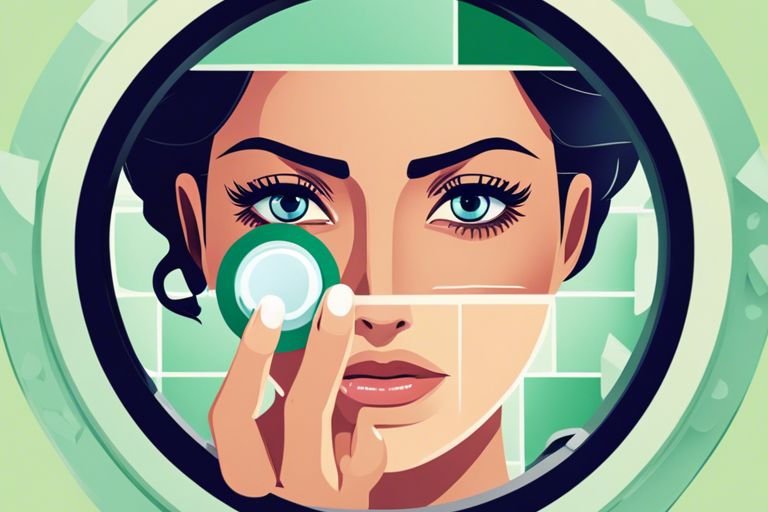If you find your eyelashes feeling greasy more often than not, it could be a sign of an underlying issue that needs to be addressed. Greasy lashes can be caused by a variety of factors, including excessive oil production, poor hygiene, or certain medical conditions. Not only can greasy lashes be unsightly, but they can also lead to eye infections, irritation, and even eyelash loss if not properly taken care of. In this blog post, we will explore the causes behind greasy lashes, the potential effects on eye health, and effective remedies to keep your lashes clean and healthy.
Key Takeaways:
- Causes: Greasy lashes can be caused by excessive production of sebum from the glands in the eyelids.
- Effects: Greasy lashes can lead to clumping of mascara, eyelash loss, and the development of eye infections.
- Hygiene: Maintaining good hygiene by washing your face and eyelids regularly can help prevent greasy lashes.
- Avoid Oil-based Products: Avoid using oil-based makeup products that can contribute to the greasiness of your lashes.
- Use Oil-free Cleansers: Opt for oil-free cleansers specifically designed for removing makeup from the eye area.
- Lash Serums: Consider using lash serums containing ingredients like peptides and biotin to promote healthier lashes.
- Consult a Professional: If greasy lashes persist despite trying various remedies, consult an eye care professional for further advice and treatment.

Understanding Greasy Lashes
Greasy lashes can be a common yet frustrating issue that many individuals face. Understanding the underlying causes, effects, and remedies is crucial in effectively managing this condition. In this chapter, we explore into the physiology of eyelashes and the various factors that contribute to oil build-up, shedding light on how to tackle greasy lashes.
The Physiology of Eyelashes
The eyelashes, much like the hair on our scalp, are composed of keratin and grow from hair follicles. They serve a crucial role in protecting our eyes from debris, dust, and other particles in the environment. The sebaceous glands at the base of the eyelashes produce oil, known as sebum, which helps keep the lashes flexible and moisturised.
Factors Contributing to Oil Build-up
Several factors contribute to the build-up of oil on the lashes, including genetics, skincare products, makeup residue, and environmental factors. When the sebaceous glands produce an excess amount of sebum, it can lead to greasy lashes. Understanding these factors can help individuals make informed choices in their daily routines to prevent and manage oil build-up effectively.
- Genetics: Some individuals may have naturally oilier skin, leading to increased sebum production on the lashes.
- Skincare products: Certain skincare products with heavy oils or emollients can transfer onto the lashes, contributing to greasiness.
Perceiving the root causes of oil build-up on the lashes is the first step in addressing this issue effectively. By incorporating proper cleansing techniques and suitable products into your skincare and makeup routine, you can maintain healthy, oil-free lashes and prevent potential irritation or infection.
Effects of Greasy Lashes
Greasy lashes can have several undesirable effects on the eyes and overall eye health. From potential eye irritations to impacts on eyelash health and appearance, it is crucial to understand the consequences of this common issue.
Potential Eye Irritations
Greasy lashes can lead to various eye irritations, such as redness, itching, and inflammation. The oil build-up on the lash line can attract dirt, dust, and debris, creating a breeding ground for bacteria. This can result in eye infections and discomfort, affecting the overall eye health.
Furthermore, the oil residue from greasy lashes can interfere with the function of Meibomian glands, responsible for producing the oily layer of the tear film. When these glands are blocked or disrupted, it can lead to dry eyes, blurry vision, and other ocular complications.
Impact on Eyelash Health and Appearance
Greasy lashes not only affect eye health but also have a significant impact on the health and appearance of the eyelashes themselves. The accumulation of oil can weigh down the lashes, causing them to become brittle and break easily. This can thin out the lashes and impair their growth cycle, leading to shorter, sparse lashes.
In addition, greasy lashes can attract cosmetic products and environmental pollutants, further compromising lash health. Over time, this can result in loss of eyelash volume and intensify the impact of ageing on the eye area.
It is essential to address greasy lashes promptly to prevent these negative effects on both eye health and lash appearance. By adopting proper cleansing routines and using suitable eye products, it is possible to maintain healthy, vibrant lashes and preserve overall eye health.
Remedies for Greasy Lashes
Proper Eyelid Hygiene
One of the most crucial steps in managing greasy lashes is to maintain proper eyelid hygiene. Cleanse your eyelids daily using a gentle eyelid cleanser to remove excess oil and debris that can contribute to greasiness. Avoid using harsh products that can strip the skin of its natural oils, as this can actually trigger the production of more oil in the long run.
Additionally, avoid touching your eyes with dirty hands and refrain from rubbing your eyes excessively, as this can exacerbate the issue. Remember to remove all makeup before going to bed to prevent oil buildup overnight, which can lead to greasy lashes.
Over-the-Counter Solutions and Home Remedies
If proper eyelid hygiene is not sufficient to control greasy lashes, you may consider using over-the-counter solutions specifically formulated to target oily eyelashes. Look for products that are oil-free and gentle on the eyes, and follow the instructions carefully for best results.
Alternatively, there are several home remedies that can help manage greasy lashes, such as using a clean mascara wand to brush through your lashes during the day to remove excess oil. Additionally, applying a small amount of baby powder or cornstarch to the lashes can help absorb oil and reduce greasiness.
While over-the-counter solutions can provide quick relief, it’s important to consult with an eye care professional if you experience persistent greasiness or any discomfort in your eyes. They can recommend the most suitable treatment based on your individual needs and ensure the health of your eyes is not compromised.

Prevention Strategies
Daily Routines for Lash Care
Implementing daily routines for lash care can significantly help prevent greasy lashes. Regularly cleanse your lashes with a gentle lash shampoo or cleanser to remove excess oils, dirt, and debris. Avoid using oily makeup removers that can contribute to greasiness. Additionally, make sure to remove all eye makeup before going to bed to allow your lashes to breathe and prevent oil buildup overnight.
Another important aspect of daily lash care is avoiding excessive use of mascara. Mascara can weigh down your lashes and attract more oil, leading to greasiness. Opt for oil-free mascaras and make sure to replace them regularly to prevent bacterial buildup and contamination which can exacerbate the issue.
When to Seek Professional Help
If you have tried various prevention strategies and are still experiencing greasy lashes, it may be time to seek professional help. Consulting an optometrist or ophthalmologist can help determine if there are underlying conditions causing the greasiness, such as meibomian gland dysfunction or seborrheic dermatitis. These eye care professionals can provide tailored solutions to address the root cause of the issue.
Furthermore, if you notice any redness, swelling, or pain around your eyes in addition to greasy lashes, it is crucial to seek professional help immediately. These symptoms could indicate an infection or another serious eye condition that requires prompt attention from a healthcare professional.

Greasy Lashes – Causes, Effects, and Remedies
Greasy lashes can be caused by a variety of factors such as excessive sebum production, poor eyelid hygiene, or certain eye products. The effects of greasy lashes can include clumping of lashes, discomfort, and an increased risk of eye infections. However, there are remedies available to combat this issue, such as using oil-free eye makeup removers, cleaning eyelids regularly with a gentle cleanser, and avoiding oily makeup products near the lash line. By taking proper care of your lashes and implementing these remedies, you can effectively manage greasy lashes and maintain healthy, beautiful eyelashes.
FAQ
Q: What are greasy lashes?
A: Greasy lashes refer to eyelashes that appear oily or shiny due to excess oil production by the sebaceous glands near the eyes.
Q: What are the causes of greasy lashes?
A: Greasy lashes can be caused by factors such as genetics, hormonal changes, skincare products, and certain medical conditions.
Q: What are the effects of having greasy lashes?
A: Having greasy lashes can lead to issues such as mascara smudging, eyelash loss, eye irritation, and an increased risk of eye infections.
Q: How can I prevent greasy lashes?
A: To prevent greasy lashes, it is important to cleanse your eyelashes regularly, avoid using oily skincare products near the eyes, and maintain a healthy lifestyle.
Q: Can diet and lifestyle impact greasy lashes?
A: Yes, a diet high in fats and processed foods, as well as certain lifestyle habits such as smoking and lack of sleep, can contribute to the development of greasy lashes.
Q: Are there any home remedies for treating greasy lashes?
A: Some home remedies for treating greasy lashes include using diluted tea tree oil, applying aloe vera gel, and using a warm compress to help remove excess oil from the eyelashes.
Q: When should I consult a doctor about my greasy lashes?
A: If you experience persistent greasy lashes despite trying home remedies, or if you develop additional symptoms such as redness, swelling, or pain in the eyes, it is recommended to consult a healthcare professional for further evaluation and treatment.
